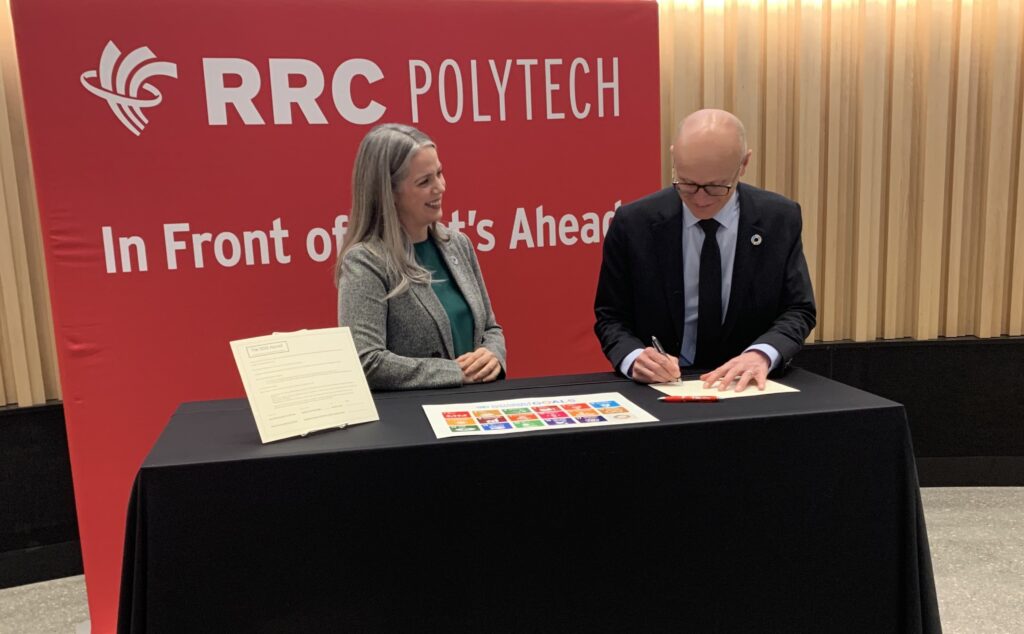College signs SDG Accord; continues to lead in sustainable development
RRC Polytech has become the first post-secondary in Manitoba to the sign the SDG Accord, committing to embed the United Nations’ Sustainable Development Goals (SDGs) into its education, research, leadership, operations, administration and engagement activities.
The 17 SDGs represent an ambitious call to action to end poverty, protect the planet and ensure that all people enjoy peace and prosperity. They align with the values in RRC Polytech’s strategic plan and directly support the College’s commitments.
“Our primary objective is training the workforce of today and tomorrow, so we are uniquely positioned to lead transformative change and build a more sustainable future — and the SDGs are a valuable tool to help us focus our efforts,” says RRC Polytech President Fred Meier.
“Sustainability is a journey without a final destination, so we’re prepared and excited to build on the current initiatives led by our Environmental Stewardship and Campus Renewal team and broaden our approach to include research, academics and all areas of College operations.”
The SDGs are a global blueprint for all people around the world to improve health and education, reduce inequality, spur economic growth and tackle climate change. They aim to achieve peace and prosperity for people and the planet, now and into the future. While each goal has its own separate objective, they are indivisibly linked and interdependent.
“We can’t have good health and well-being without clean water, and we can’t have sustainable, inclusive communities without reducing inequality,” says Sustainability Specialist Stephanie Fulford. “So while the goals are ambitious, they reflect the scope of our global challenges, give us real targets to strive toward and a pathway to achieve them.”
“We also recognize that to achieve these goals will require all of us, in every sector of society, to work together — which is why formally signing the accord is so important.”
The SDG Accord is a commitment that learning institutions are making to one another to do more to deliver the goals, to annually report on progress, and to do so in ways that share learning between institutions, both nationally and internationally.
It is a worldwide partnership, representing 361 institutions and 85 countries, designed to inspire, celebrate and advance the critical role that education has in delivering the goals and the value they bring to governments, business and wider society.
In signing the accord, RRC Polytech pledges to:
• Align all major efforts with the SDGs, targets and indicators.
• Aim to involve members from all key stakeholder groups in this endeavor, including students, academics, professional staff, local communities and other external stakeholders.
• Collaborate with other signatory institutions as part of a collective international response.
• Share its learning.
• Annually report on its progress toward the SDGs by answering the questions “how does my institution contribute to the SDGs and what more can we do?”
To demonstrate the SDGs’ impact in the classroom and in the community, Ginger Arnold, Indigenous Education instructor, presented the course material she’s developed based on the global blueprint.
Arnold teaches Social Innovation and Community Development at the College, and after joining an internal panel exploring the interconnected nature of the SDGs at RED Forum — a staff and faculty professional development day — last spring, she identified them as an excellent opportunity to connect with her students, many of whom attended the on-campus signing ceremony last week.
“We can naturally braid Truth and Reconciliation with the Sustainable Development Goals because each of the goals have environmental, economic or social benefits that can be aligned within the six categories outlined in the 94 Calls to Action: child welfare, education, language and culture, health, justice, and reconciliation,” Arnold says.
“Having a better understanding of these relationships will help our graduates drive change in their communities as they work to plan alternative tomorrows with hope.”
Sustainability is much more complex than just overcoming environmental challenges. It also means continuously adapting resource use for maximum efficiency with minimal environmental impact and collaborating to expand the reach of the College through connection and communication.
See the full list of signatories.

